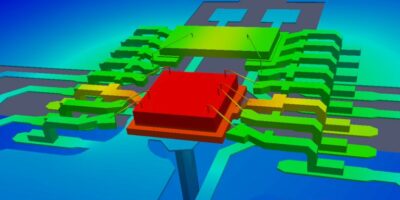Cadence employs electrical-thermal co-simulation for system analysis
Multi-physics technology is used in the Celsius Thermal Solver, claimed to be the first complete electrical-thermal co-simulation for system analysis, from ICs to physical enclosures. Cadence Design Systems claims that its parallel execution delivers up to 10X faster performance than existing solutions without compromising accuracy.
It follows the release of the Clarity 3D Solver earlier this year. It is based on a production-proven, massively parallel architecture that delivers up to 10X faster performance than legacy solutions without sacrificing accuracy, explains Cadence. The Celsius Thermal Solver seamlessly integrates with Cadence IC, package and PCB implementation platforms to enable new system analysis and design insights and empower electrical design teams to detect and mitigate thermal issues early in the design process to reduce electronic system development iterations.
Developers generally and those incorporating 3D-IC packaging in particular, face thermal challenges that can cause late-stage design modifications and iterations. As the industry moves towards smaller, faster, smarter and more complex products with greater power density, they need to deploy time-consuming thermal transient analysis techniques with traditional steady-state analysis to address multiple power profiles and increased heat dissipation. Traditional simulators require the electronics and enclosures being modelled to be substantially simplified, which reduces accuracy.
The Celsius Thermal Solver combines finite element analysis (FEA) for solid structures with computational fluid dynamics (CFD) for fluids and enables complete system analysis in a single tool. Using the Celsius Thermal Solver in conjunction with the Clarity 3D Solver, Voltus IC Power Integrity and Sigrity technology for PCB and IC packaging, engineers can combine electrical and thermal analysis and simulate the flow of both electricity and heat for a more accurate system-level thermal simulation than legacy tools, says Cadence. The Celsius Thermal Solver performs both static (steady-state) and dynamic (transient) electrical-thermal co-simulations based on the actual flow of electrical power in advanced 3D structures, providing visibility into real-world system behaviour.
Analysis of thermal issues early and sharing ownership of thermal analysis, allows engineers to reduce design re-spins and enables new analysis and design insights not possible with legacy solutions, says Cadence. The Celsius Thermal Solver accurately simulates large systems with detailed granularity for any object of interest. It is, claims Cadence, the first solution capable of modelling structures as small as the IC and its power distribution together with structures as large as the chassis.
The Celsius Thermal Solver supports Cadence’s Intelligent System Design strategy, enabling system innovation. It is built on matrix solver technology that is production proven in the recently announced Clarity 3D Solver and the Voltus IC Power Integrity Solution. It is optimised for cloud environments.
The Celsius Thermal Solver is currently being used in production by select customers and is in general availability now.




